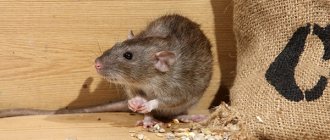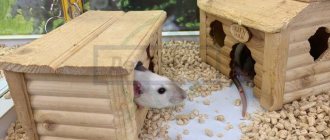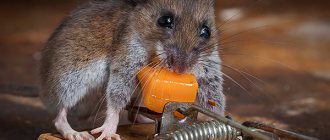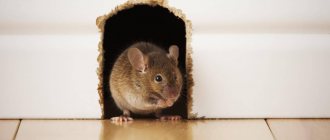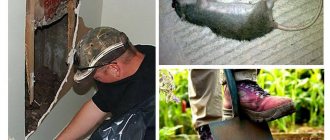02/08/2018 Category: RodentsAuthor: Lara Lisina
No matter how great the scientific progress of mankind, including in agriculture, there are problems that still cannot be completely solved. One of them is mice. Over many years of fighting against annoying rodents, people have accumulated a truly extensive arsenal of so-called folk remedies - from household chemicals to aromatic herbs. What is the best way to get rid of mice?
- 2 House without mice
2.1 Fragrant herbs-helpers2.1.1 Herbs against mice - photo gallery
- 2.2.1 Peppermint against mice
Causes of rats
Free access to products is a sure way to attract pests.
The appearance of rats in an apartment or private house can be due to the following reasons:
- Excess of individuals at the previous place of residence: the more rats live in one territory, the more food they consume. If there is no longer enough food, some of the animals go in search of it.
- Accessible food and water: If you leave leftover food on the table, don't pick up trash, and don't wipe up crumbs, rats will quickly realize that there is money to be made here.
- Rodents are poisoned in their previous place, for example, in the basement: this forces them to urgently run and look for a suitable place.
- Ability to enter the house: If there are cracks in the corners and walls, it will be easier for rats to get inside.
Important! Most often, rats come from neighbors or from the street - when one batch is destroyed, another may come in its place from the same place
Unpleasant odor for rodents
What smell mice are afraid of has been determined by people through observation and trial and error. During the tests, it became known that rodents cannot tolerate strong odors. They repel mice with pharmaceutical preparations, plants, essential oils, and flammable liquids.
Singed wool
If mice have settled in the house for a long time and are not going to move out, you can use one effective, not very humane method. Catch a mouse, set the tail on fire, release it. The frightened animal will run into the hole to its relatives. Rodents cannot stand the smell of burning wool. The mouse itself will drive away its relatives.
The smell of a cat's burnt fur repels rodents even more. Trimming your pet's hair slightly will create a nightmare for rodents. If there is no animal in the house, you can set fire to an old woolen product, or a skein of thread, and put it in a hole.
How to scare away mice if there is a cat in the house, even the laziest one, the question should not arise. Cat urine is the best mouse repeller. No one can stand its pungent smell, especially rodents. Also, a cat can eat a mouse if it catches it.
Plants
- Sagebrush. The grass gives off a strong odor that mice cannot tolerate. Twigs of a fresh plant are laid out in places where rodents have been seen, in burrows, if the location is known. The result is more effective if the room is smoked with grass. They set fire to wormwood branches and walk around the apartment. Smoke penetrates into the smallest cracks and reaches rodents anywhere. Instead of wormwood, you can use tansy. The effect is similar.
- Peppermint for mice is one of the most effective ways to control rodents. For humans it is a safe and even useful remedy. Pick fresh leaves of the plant and place them around the perimeter of the room. If mice have settled in the apartment, you can create an aura of a persistent minty smell using essential oil. Drop peppermint oil onto a candle and light it. A pleasant aroma will fragrant throughout the room, smell for a long time, and drive mice crazy.
- Grouse bulbs. The root of the flower has an unpleasant onion odor, which causes fear in rodents.
- Blackroot. Affects the nervous system of rodents. The mice hear it several meters away and try to quickly hide. Contact with this plant is fraught with severe mental disorders. The smell follows the pest everywhere, gradually driving it crazy.
- Swamp wild rosemary. Contains toxic oils. After contact with the plant, mice receive a lethal dose. The remaining individuals run away from him wherever their eyes look.
- Chamomile. Pyrethrum is an effective remedy against many pests and is safe for humans. A tincture can be used. According to reviews, the effect is even better.
If it is impossible to find herb against mice, you can buy a mixture or extract at the pharmacy, it will also work. But it should be scattered in larger quantities.
In addition to plants, you can use fruits - orange. The persistent orange aroma of the zest lasts a long time, but does not cause any unpleasant sensations in humans. Scatter the peels around the room. You can also add garlic cloves.
Liquids with a strong odor
Scaring sounds
There is another answer to the same question - mice are afraid of extremely quiet sounds. This is the basis for the action of an ultrasonic rodent repeller. The device emits waves of different frequencies that humans cannot detect, but rodents can hear. Constantly being in this state causes mice and even rats to flee.
Repelling is one of the surest ways to get pests out of your home. Next, you should make sure that they do not have the opportunity to return to it.
When a housewife discovers signs of the presence of mice in her home, she may panic. This unpleasant neighborhood is fraught not only with a frightening rustle and spoiled food, but also with the risk of infection with dangerous diseases.
Safe plants
What smells are mice afraid of from plants? There are several such herbs that will not harm human health. They are suitable for use in apartments and country houses. This method is in demand due to safety. It is often used where there are children and pets. What smell are mice afraid of from plants that are safe for humans? The most popular include:
- Mint. This herb has a pleasant aroma, so it evokes positive emotions in most people, but rodents cannot tolerate it. Dry leaves should be laid out in the room where mice live, and then left.
- Sagebrush. The bitter aroma scares pests. An effective method is not only hanging grass, but also fumigating the space with smoldering wormwood.
- Grouse bulbs. The emitted garlic smell that the roots of this plant have is not tolerated by mice.
- Swamp wild rosemary. The essential oil of the plant contains components harmful to rodents. Parasites perfectly sense the threat even over long distances.
- Effective repellents are tansy, feverfew, and chamomile.
This is the smell that mice are afraid of in the house. With these plants it will be possible to remove pests and also prevent the appearance of new individuals. These plants are easy to use; you just need to spread fresh or dried herbs without separating the roots and leaves where parasites usually live. Mice will leave such a room. After the aroma of the plants wears off, they are replaced with fresh herbs.
What repels rats from chemical poisons
Chemical poisons are easy to use and effective
Depending on the main active poison, chemical poisons can act on different organs and systems of the rat: nerves, lungs, digestion, circulatory system. Most poisons act within 2-3 days: during this time, the poisoned rodent manages to lead other rats to a new feeder.
To die, a rat needs to eat a certain amount of poison in a short period of time. If she eats less than necessary, there is a high probability that the body will adapt, and in the future the poison will no longer act.
The most effective means of removing pests include the following:
- “Rat Death No. 1”: comes in the form of a soft mass in individual briquettes, which is capable of destroying almost any rodent. It begins to act after 2-3 days: the rat develops internal bleeding and suffocation, and it dies after 7-10 days. The mixture is completely ready, has a pleasant, attractive aroma: you need to transfer the bag into a bowl and leave it near the entrance to the hole. You cannot touch the poison with your bare hands. The average cost is 50-60 rubles.
- Ratpon: a more expensive imported product, available in granules, packaged in 40 gram bags. The active substance has a painless effect on the body, prevents blood from clotting, which causes internal bleeding. Thanks to edible additives, the rat actively absorbs the granules. Death occurs within 4 days. The average cost is 220-230 rubles.
The only downside of Ratpon is the price
- Help: produced in the form of edible granules, which just need to be scattered in the right place. The product consists of poison, which has a cumulative effect, and food additives that cause appetite - the more the rat eats, the more it wants, and the faster the poison accumulates in the liver, poisoning the entire body. The average price is 30 rubles.
- “Krysin”: available in the form of briquettes (ready to use) and gel (must be mixed with edible bait, for example, oil). This is an extremely toxic product that is highly effective: most of the colony dies within the first 3-4 days. When using “Rat”, you need to remove water from the treated area: if the rodent drinks soon after eating the poison, its effect will decrease. The average cost is 50-60 rubles.
- "Tricotta": can be used in places with high humidity. Available in the form of briquettes - 16 pieces of 10 grams. After entering the body, 3-6 days later the rat feels suffocated, runs out of the hole and dies on the street. This allows you to not be afraid that the body will not be found and it will begin to decompose. The average price is 80 rubles.
Ways to fight
There are many methods for controlling small pests. Most of them were known many centuries ago. The most popular are:
- mousetraps and baited traps are not the most humane way to get rid of rodents;
- poisonous baits and poison for mice - are an effective weapon against pests, but also dangerous for the owners themselves, their children and pets;
- scaring away with loud sounds is a safe and effective way to temporarily drive animals away;
- strong and spicy odors repel mice no less effectively;
- having a cat or dog that will hunt rodents.
Installing mousetraps and traps is the first thing the owner thinks about if mice appear in the house. This method is effective if the population is small, and after catching some pests, they will not be replaced by others. Mouse baits containing toxic substances affect the rodent's nervous system, and after a while it dies. The catch is that a mouse can die by huddling in a place inaccessible to humans. Over time, her corpse will begin to emit an unpleasant odor, but finding it will not be easy.
Boric acid gets rid of mice no worse than other remedies. Its chemical composition is harmless to humans, but has a fatal effect on small rodents. You need to make balls of boric acid, flour, raw eggs and sugar, and place these baits along the routes of movement of pests. When poison enters the animal’s body, paralysis of the internal organs occurs, and the animal soon dies.
The logical solution to getting rid of mice in a living space is to have a cat. Moreover, a pet does not have to be a skilled hunter. Cat urine helps a lot against mice. Its characteristic smell repels rodents, reminding them of the presence of a predator in the house.
The most harmless and accessible folk remedies for mice are repelling them with loud sounds or strong-smelling plants and chemicals.
How vinegar will help get rid of mice in the country
It is quite difficult to get rid of mice in a summer cottage, since their distribution area is wider. In this case, you will have to use 70% vinegar for better effect.
Author's note Olga Kirilova
When processing, wear a mask to prevent the smell of acid from burning your respiratory tract and causing headaches.
Processing process:
Purchase 5-6 bottles of acetic acid 70% at once. It must be chemical and unsuitable for food. Pour the liquid in large quantities into several enamel containers. Place around your dacha area
Pay special attention to the premises. Even those of them that are in desolation.
The smell will scare away the mice and they will run away. This method is suitable for processing only if you do not plan to spend the winter at the dacha. Otherwise, the strong aroma of acid will harm your own health. Processing is carried out in the autumn. In spring, you should remove all containers and ventilate the room.
There is an old kettle left at the dacha, don’t rush to throw it away. Find out how to properly descale a kettle with citric acid and it will still serve you well.
What harm do mice do at home?
The presence of mice brings with it the following negative aspects:
- An unpleasant odor that is quite difficult to get rid of using simple methods. For example, ventilation. More careful processing will be needed.
- Rodents spoil food. At the same time, they do not disdain anything: they use cereals, pasta, cheeses, sausages and more.
- Pests' teeth grow quickly, so they need to be constantly sharpened. So mice chew on wooden, plastic surfaces, and various building materials.
- They damage electrical wiring, telephone cables, and water pipes.
- They are carriers of various infections and diseases that are dangerous to human life. Among them are plague, salmonellosis, typhus and more. And allergens are transmitted with particles from skin and fur.
- Can infect domestic animals.
- If a rodent's life is in danger, it can be very aggressive and attack first. Mice can jump up to 1.5 meters in height.
To learn how to protect your home from mice, watch the following video below:
Let's dispel the myths
Are folk remedies for mice effective? Home remedies, in fact, do not work at all. You will probably notice a temporary effect and perhaps a decrease in the number of pests, but these methods will not permanently get rid of mice.
Rats and mice are quite smart creatures. They know they live in a dangerous world as soon as they find a place where they can live safely from predators, have access to water and food, and would rather put up with ultrasonic waves and mint than risk leaving their new home.
Naphthalene.
It is a strong-smelling white solid. When inhaled or swallowed, blood cells lose their ability to carry oxygen. It was believed that placing mothballs near mouse nests would get rid of the rodent problem. However, it is not. The amount contained in tablets sold in stores is sufficient to kill moths and other insects, but not mice. The level of substance required for rodents should be the same as for humans. The mice won't pay any attention to it.
Even if rodents are bothered by this smell near their entrance, they will soon find or gnaw another one, a hole the size of a coin is enough for them.
And will you be happy if all your things smell of a specific aroma?
Mint.
The rooms are filled with a pleasant aroma that gets rid of mice, making it an ideal repellent? WRONG!
As in the first case, this is only possible if there is a high concentration, because mice have a sensitive sense of smell. Logically, mice live in all areas, including sewers. If they can put up with the smell coming from the smelly sewer system, then peppermint won't give them any problems.
Other folk remedies for mice are just as unreliable; let’s add hunting cats to the exception.
Do mammals respond to sound?
Oddly enough, rats and mice are very scared of loud noises. Animals will not live in a house where music is playing loudly, or a drill or other power tool is running.
Another way to repel tailed pests is with ultrasonic devices. High cost is their main drawback. Pests cannot withstand the ultrasound generated by the device, so they rush to leave the room as soon as possible. These sound waves are not perceived by the human ear, and therefore are completely safe for health.
To obtain the desired result, it is important to choose the right ultrasonic rodent repeller. Its power must correspond to the area of the room. Otherwise, it will not be possible to get rid of rodents. An equally important nuance is the ability to change the frequency of the signal, since the same sound can cause addiction in parasites.
Methods for repelling mice with smell for non-residential premises
If rodents have chosen a pantry or garage where there is no food, you can use rather unpleasant odors, as well as poisonous plants that are not suitable for a residential building. Mice, in general, like people, do not tolerate the following “odors” well:
So repelling with peppermint oil is the best way to control rodents rather than arrest and kill, right? Well, if you are wondering how to use it, then take a look at some of the steps you need to follow. Soak large cotton balls with plenty of peppermint oil and place them in the corners of all rooms, randomly making your house smell like peppermint, literally! You will need to repeat this process several times to truly get rid of the mice. And remember to be patient, don't expect them to match easily. Another way to do this is to plant meat plants in the yard, but preferably near the entrance. This will automatically prevent rats from entering your home without the need to buy peppermint oil. Buy peppermint oil from a pharmacy near you. . I think by now you must have realized how easy it is to get rid of rodents!
Burnt rubber;
Burnt wool or fluff;
Kerosene;
Cheap Soviet-made perfume products;
Naphthalene.
In residential apartments and houses such odors are, of course, unacceptable. But if the room is visited infrequently, then specific “aromas” will help repel rodents.
Mice control products
Of course, if you have a little patience and if you follow the tips above. It's true that we can't do much against them, but if you ask me, a clean kitchen will keep mice at bay! It is generally not difficult to repel insects and vermin effectively rather than aggressively. Just use products that we like, but they don't.
Incredible facts about rats that you won't immediately believe
First of all, it is important to reduce their habitat: avoid lumber or other objects under which they hide and take cover. Mowing the ground also helps reduce their hiding and mobility
To repel them, scatter gray wood, rosemary or coffee grounds. Saponaria, parsley and garlic are also good repellents, like pumpkin.
Another plant that rodents fear is blackroot. You should not use it indoors, since the grass releases a large amount of dangerous alkaloids. Mice literally sense poison on a subconscious level and stay away from it.
Ratcatcher
Rathorn (black root) is one of the most famous plants, the smell of which is not tolerated by mice and rats. Black root against rats and mice is used both fresh and dry. Powdered dry roots, a strong decoction of them, and plant juice are used as a poisonous component for preparing food baits.
Rodents will also not appear in a room where fresh or dry rat grass is laid out. However, due to the large number of dangerous alkaloids, the plant is not recommended for use in apartments or residential buildings. Therefore, when working with it, it is necessary to use a respirator and rubber gloves.
It's not just the smell of rat exterminator that scares away animals. What mice and rats fear most is the seed of the plant, which clings firmly to their fur. You can protect animals’ access to the area by planting several blackroot seedlings near the house and outbuildings.
Essential oils
Another pest repellent is essential oils. Their concentrated odors are not liked by rats and mice. It is enough to place an oil-soaked swab or a piece of cloth next to the rodent's hole, which will smell strongly, and the mouse family will no longer live there.
Essential oils should be used with extreme caution, as their concentrated odor can cause an allergic reaction.
Plants against pests are used quite widely. However, rodents are repelled not only by herbal aromas. The smell of kerosene, burnt rubber and even perfume products is also detrimental to parasites. However, most of them are preferable for use in non-residential premises.
What smells can repel rodents?
Not only herbs can repel rodents. What smell do they still not tolerate? Mice run away from various pungent “odors”:
Using these products at home is also easy. To do this, you will need to prepare several small rags, moisten them with ammonia, bleach or vinegar and place them in mouse holes. These cloths will need to be changed from time to time so that the rodent repellent does not erode. Thus, in just a few days, the smell of vinegar or bleach will allow you to completely clean your home of rodents.
Several years ago it was also believed that mice did not touch glass wool and did not enter those houses where it was present. But in fact, this statement is not entirely true. The fact is that rodents were really afraid of glass wool, but only that which was produced according to Soviet standards. Its modern analogue is quite soft and practically cannot harm rodents; there are even cases of mouse nests being discovered directly in glass wool.
Three traditional methods for mice - video:
https://youtube.com/watch?v=mD2ou_eYJ8c
Prevention of mouse infestations
If you have gotten rid of rodents, there is no need to relax. They may visit your home again. Therefore, try to follow a number of simple rules:
- Store products in refrigerators or closed containers out of reach of mice.
- The apartment must be in immaculately clean condition.
- If the house (apartment) is old, then seal all the holes and openings so that “not a single mouse gets through.”
- Place wormwood, mint, or cotton balls soaked in essential oil in the corners.
- Get a mustachioed hunter cat.
Sometimes mice cause us sympathy, because they are so cute and fluffy, they have funny habits. There are hobbyists who keep pet mice. But remember that they carry dangerous diseases such as tularemia, leptospirosis, salmonellosis and others. In addition, they need to constantly grind down their incisors, so mice chew on everything: furniture, wires, walls, floors. Their appearance in the house is associated with a lot of troubles. And the methods you just read about will allow you to get rid of “uninvited guests.”
https://youtube.com/watch?v=mD2ou_eYJ8c
Sources
- https://vrediteli.info/zapahi-protiv-mishey/
- https://GdeKlop.ru/krysy/izbavitsya-pri-pomoshhi-zapahov/
- https://kitchendecorium.ru/posts/kak-otpugnut-myshej-ot-kvartiry-i-doma-s-pomoshhyu-zapaxov.html
- https://parazitdoma.ru/krysy-i-myshi/kakoy-zapah-ne-lyubyat-myshi
- https://kursi-floristiki.ru/tarakany/kakoj-zapah-ne-lyubyat-myshi.html
- https://www.ivd.ru/dizajn-i-dekor/zagorodnyj-dom/kakoj-zapah-v-dome-otpugivaet-myshej-izbavlyaemsya-ot-gryzunov-bystro-i-bezopasno-55741
- https://OUborke.ru/chego-boyatsya-myshi
- https://poklopu.ru/krysy/chego-boyatsya-myshi-v-dome.html
- https://pestout.ru/domashnie-vrediteli/gryzuny/chego-boyatsya-myshi.html
How to get rid of mice using traditional methods
Many time-tested recipes do not kill rodents, but only scare them away, forcing them to stay away. You should not expect an instant effect from them. Most likely you will have to wait a few days.
Traditional methods really help drive mice out of the house, and their effect is no worse than modern drugs that are sold in specialized stores. Such recipes are safer for humans and pets and help prevent the reappearance of parasites in residential areas. The only drawback is that it doesn't act too quickly. Let's look at the most effective methods:
Sagebrush
- The smell of some plants is simply unbearable for rodents. It is worth using them to ensure that mice leave the house. Pyrethrum, chamomile, elderberry, tansy, wild rosemary, and wormwood are used to combat parasites. The essential oils that make up such plants emit a rather strong aroma. It is acceptable to use both fresh and dried plants. Fresh herbs are collected in small bouquets, laid out around the room or hung above the floor surface. Dry leaves are crushed and placed in small bags, which should be placed in the corners of rooms, as well as near mouse holes. Wormwood is used to fumigate rooms.
- To prepare another repellent “recipe” you will need ammonia, bay leaf and table vinegar. Bay leaves must be moistened in one of the indicated liquids and placed next to cracks, products, and corners in the room. After this procedure, the mice will definitely leave.
- In order to prevent rodents from entering private or country houses, it is enough to plant wormwood or mint bushes in the garden.
- You can drive mice away from non-residential premises - basements, sheds, garages - using unpleasant odors. You shouldn't use them in the house, because people won't like them either. So, parasites will quickly leave a place that smells of burnt rubber, burnt wool or fluff, kerosene, or mothballs. A similar effect is characteristic of cheap Soviet-made perfumes. All these pungent, pungent odors are good at repelling pests.
- A simple and at the same time effective means of controlling rodents is ordinary wood ash. It is placed in places where parasites were found, as well as in all crevices and burrows. Often, ash along with crushed glass shards are scattered around the perimeter of the foundation during the construction phase of buildings. The ash contains alkali, which can cause severe irritation on the paws of mice. They will not be able to come into contact with these substances and will go elsewhere in a few days.
- Herbs are not always available, especially in the city, so essential oils can be used as an alternative. These substances are characterized by a stronger aroma. Mice cannot tolerate the smells of peppermint, Japanese mint, eucalyptus, tansy, and cloves. In order to drive out parasites, it is enough to soak a rag or a piece of cotton wool with a small amount of oil, and then place it next to the mink. Rodents simply cannot live next to such odorous extracts. A solution prepared from one of the listed oils with the addition of a small amount of vinegar will be effective. The finished composition is poured into cracks and mouse holes. For spraying with a spray bottle, you can prepare a mixture of essential oil, alcohol and water.
If you use essential oils, you must work with them very carefully. Many of them can cause severe allergic reactions in humans.
Safe plants
What smells are mice afraid of from plants? There are several such herbs that will not harm human health. They are suitable for use in apartments and country houses. This method is in demand due to safety. It is often used where there are children and pets. What smell are mice afraid of from plants that are safe for humans? The most popular include:
- Mint. This herb has a pleasant aroma, so it evokes positive emotions in most people, but rodents cannot tolerate it. Dry leaves should be laid out in the room where mice live, and then left.
- Sagebrush. The bitter aroma scares pests. An effective method is not only hanging grass, but also fumigating the space with smoldering wormwood.
- Grouse bulbs. The emitted garlic smell that the roots of this plant have is not tolerated by mice.
- Swamp wild rosemary. The essential oil of the plant contains components harmful to rodents. Parasites perfectly sense the threat even over long distances.
- Effective repellents are tansy, feverfew, and chamomile.
This is the smell that mice are afraid of in the house. With these plants it will be possible to remove pests and also prevent the appearance of new individuals. These plants are easy to use; you just need to spread fresh or dried herbs without separating the roots and leaves where parasites usually live. Mice will leave such a room. After the aroma of the plants wears off, they are replaced with fresh herbs.
Cats and their smell in the house
Everything is simple here: cats are the natural enemies of rats and mice, and therefore rodents avoid places where there are fresh traces of cat activity. Even if a cat does not hunt pests in the house (which often happens with pampered pets), rats are afraid of their smell, which reduces the likelihood of rodents, but does not guarantee their complete absence.
It should be noted that although we are talking about the smell of a cat, this does not mean that all the walls and furniture in the apartment should be thoroughly saturated with the pungent aroma of cat urine. Rats have a keener sense of smell than humans, and they are afraid to enter rooms with a cat, where a person may not feel any odors at all. And if the owners of the house forget to change the litter in the tray from time to time, the corresponding aroma will literally “hit the rats’ nose”, and they will prefer not to run into the room again.
If a cat does not catch rats, they can get used to its smell over time and calmly tolerate such proximity. In this case, rats usually simply live in the same house as the cat, but avoid direct encounters. Particularly impudent rodents can demonstratively go about their business in full view of the cat, and sometimes even attack it.
Here, by the way, a lot depends both on the character of the rat itself and on the experience of the cat. It happens that cats are afraid of rats because they have never met them in their lives and do not know how (and most importantly, why) to catch these neighbors in their housing. Pets who grew up in apartments and have never obtained natural prey behave this way especially often. Even experienced, but lazy and always well-fed cats do not hunt rodents simply out of laziness, and if rats behave particularly impudently, they may even be afraid of them. It is in such cases that various comical situations arise when a rat can scare cats or even drive them away from food.
Normally, cats are not afraid of rats, and if you do not overfeed them, they actively hunt them for fun and fresh meat. In rural areas, cats are specially fed only from time to time so that they switch to pasture and feed on pests in the house and garden.
From all of the above, we can conclude: rats are afraid of cats when they hunt them. The cat itself and its smell can scare off pests at first, but once the rats understand that the cat poses no danger to them, it’s just a matter of time before the rodents move into the house.
It is also interesting that mice are afraid of rats, since rats, as larger predators, pose an immediate danger to them. However, this fact is not useful in practice in the fight against rodents.
Who are pests afraid of?
Not all rodents are afraid of cats. The exception in this case is large pasyuki or gray rats. Many of them are able to move freely in broad daylight, without paying much attention to the mustachioed pet sitting next to them. However, there are also brave cats who are not afraid to attack uninvited guests. The dog easily attacks a large rat.
The cat will provide invaluable service in catching small parasites. Rodents are very afraid of even the cat smell that is present in the apartment. Having cleared the house of pests, many mustachioed predators go hunting in neighboring areas. Mice and rats are no less afraid of birds.
Rats versus mice are also a common occurrence in nature. Where large rodents have settled, small ones will never appear. After all, a hungry rat poses a serious danger to a little mouse. Rodents are also afraid of people, but in some cases rats can attack humans.
How to get rid of the smell of mice in the house
If the unpleasant odor is caused by a mouse corpse, then the owner’s task is to find it and eliminate it. Most often, the mouse dies under the floor of the house or between the ceilings of the walls. To remove them, you have to dismantle the floor or break out part of the wall.
If mice feces create an unpleasant odor, then resort to folk remedies or store-bought medications.
Mouse odor can be easily eliminated using the following means:
- Take a piece of cotton wool and set it on fire. Leave it to smolder with the windows and doors closed for 2-3 hours.
- Wash the floor and other surfaces with a vinegar solution (take 80 ml of table vinegar per 1 liter of water). This solution is also sprayed on walls and furniture.
- Treat the suspected mouse passages with bleach or other chlorine-containing products.
It is recommended to thoroughly clean and ventilate the living space every 60 minutes. Bags of table salt are also placed throughout the rooms. It is able to absorb unpleasant odors and also has a bactericidal effect.
If available home remedies do not justify themselves, then you can resort to store-bought chemicals (Medifox Dez, Petrospirt, Chlorapin).
Chemical preparations are good because they do not just mask unpleasant odors. They contain active ingredients that destroy pathogenic bacteria.
The mouse is afraid of different scents
To completely get rid of rodents, it is important to choose the right repellents. When thinking about what to use, the housewife must take into account her family composition, as well as the room where the fight will take place
If you find an error, please select a piece of text and press Ctrl+Enter. We will definitely fix it, and you will get + to karma
Mice and rats are a terrible problem for any homeowner. Many people wonder what kind of grass are afraid of mice and rats in the house? After all, toxic chemicals sold in stores not only kill rodents, but also harm pets.
Plants do not kill rats and mice. They scare them away. Therefore, you won’t have to get rid of dead animals, and a pleasant herbal aroma will appear in the house.
What else are pests afraid of?
The question of what smell repels rats and mice is puzzled by those who, for one reason or another, cannot use chemicals.
- Bleaching. The smell of this substance is actually avoided by mice and rats. However, one should also take into account the fact that when using this product in a residential area, the inhabitants of the home themselves will have to inhale its aromas.
- Vinegar. Has properties similar to bleach. Inhaling its vapors is also unsafe for humans.
- Naphthalene is a strong carcinogen, and therefore experts do not recommend using it in residential areas.
Removing uninvited guests from your home
Herbs are not only safe, but also poisonous. If there are children or animals in the house, then it is better not to use toxic products or place them in hard-to-reach places.
Dried herbs are collected in bunches and placed in the corners of the room where pests most often live. The herbal scent has a beneficial effect on the human body, calming the nervous system and eliminating headaches. You should consider which herbs can be used in houses and apartments:
Ratrunner or blackroot. The name speaks for itself: its smell repels rats and also saves from mice. For control, dried root powder, juice and decoction of rhizomes are used. You can simply dry the grass and spread it indoors. Before laying it out, the ratcatcher is scalded with boiling water so that the smell is strong. People won't feel it. It must be remembered that this plant is very poisonous.
When working with it, be careful and use gloves
If rodents are not constantly in the house, but appear periodically, then you can plant the desired plant in a flower pot. This way there will be no need to collect and prepare herbs. Chamomile and mint take root well at home. Moreover, they have a beneficial effect on the human body and will not cause harm if they grow in the house.
Having chosen plants for pest control, you need to determine where to place them. Poisonous herbs are placed only in places where rodents frequent or near their burrows. Safe plants are placed throughout the house. Renew the herbs placed around the house once a week.
Using the contents of the kitchen cabinet
Even in the kitchen cabinet you can find simple means for removing rodents. The most common varieties used in cooking are presented and described here. They are found in almost every kitchen.
Carnation
Cloves are the dried flower buds of evergreen plants with red and white flowers. The buds must be harvested at the right time, and it takes between 4,000 and 7,000 buds to produce one pound of cloves. The aroma of this plant is comparable to tobacco, as it has a bright, interesting smell. If you set fire to a dry clove, the smoke from it will scare away harmful rodents, insects, and blood-sucking parasites.
Coriander or cilantro
The term "coriander" is often used to refer to a spice made from the dried fruit of the Coriandrum sativum plant. This herb is also called cilantro or Chinese parsley. The fruits, or seeds, are small and round, brown or tan in color. They are sometimes called coriander or coriander seeds. Cilantro leaves have a spicy taste and aroma that often causes extreme reactions. People either love him or hate him. Small animals react very negatively to coriander.
Chilli
Chili peppers are in the line of vegetables with garlic, onions, and peppers. Among them, it is the most caustic, pungent, and bright in both taste and aroma. Its strength and hardness are not inferior to vinegar or ammonia. Small and large animals, rodents, insects, and even people cannot stand such a specific smell. It can be used in any form - fresh, dried.
Sage
Sage is an herb with oblong gray-green leaves that are used in cooking and herbal medicine. The herb emits a pungent, slightly astringent odor. Fresh leaves are usually used, although it is one of the few herbs that actually has a more intense and concentrated flavor when dried. If you buy dried sage, you should store it in a cool, dark place in an airtight container to preserve its specific properties. Growing sage is relatively easy. It will thrive in most environments as long as it is in sunny, well-drained soil. Small animals do not like its aroma.
The simplest and most effective folk remedy for mice
Since mice have a natural aversion to vinegar, you can make an excellent budget-friendly rodent control product yourself before the problem gets out of hand. Here are step-by-step instructions that will help you successfully fight mice in your house, apartment or country house.
To get rid of mice you will need:
Step 1
Rid your home of any food available to mice. Remove all crumbs, grains, etc. from pantries, closets, attics or basements, where mice appear most often. Check every nook and cranny of your home and treat these areas with a solution of vinegar and water in a 1:1 ratio. Vacuum and wet mop the floor thoroughly to remove any food that may be accessible to rodents.
Step 2
Prepare the cotton balls just before use, as the smell of fresh vinegar is the most potent on mice. Wear rubber gloves, hold the cotton balls in your hand, and pour the vinegar over the bowl until they are completely soaked. Make as many cotton balls as needed.
Step 3
Place cotton balls in places that mice have already chosen and where they are most likely to appear: under the stove and countertops, in and behind cabinets, under the sink, in the pantry, etc. Use cotton vinegar swabs to plug any cracks and holes that could be potential entry points for mice into your home.
Step 4
When the cotton balls are dry and no longer smell like vinegar, replace them with new ones. Keep in mind, dried cotton balls lose all their repellent properties.
Step 5
Make sure the vinegar actually acts as a deterrent to mice. Monitor whether rodents will appear in the house after measures have been taken to repel them. Check for mouse droppings in food storage areas or where you find them most often
Also, notice if the creaking and grinding noises under the floors or in the walls have disappeared. Mice create a certain amount of noise as they scurry around the house—its absence may confirm that the vinegar balls venture was a success.
This method does not kill mice. It simply discourages rodents from being your neighbors and forces them to move to another place where there is no vinegar smell.
Article protected by copyright and related rights. When using the material, an active link to the women's magazine gospodarka.ru is required!
And in addition to the above, we suggest you learn another environmentally friendly way to deal with mice. Don't miss the interesting video below!
What pets will help get rid of rodents?
Of the domestic animals, mice are most afraid of cats. These small domestic predators can kill up to 57 rodents on average per year. In most cases, when contacted by a mouse, the cat immediately attacks it; it either kills its own victim or plays with it until the latter dies. Cats do well with all types of rodents, with the exception of large gray rats, since the latter often exceed their size.
Also, domestic mice are afraid of some breeds of dogs. Like cats, these animals protect their territory and try to exterminate any living creature that enters it.
As for people, mice are afraid of them, but only partly. Rodents try not to catch their eye, but easily settle in their homes.

